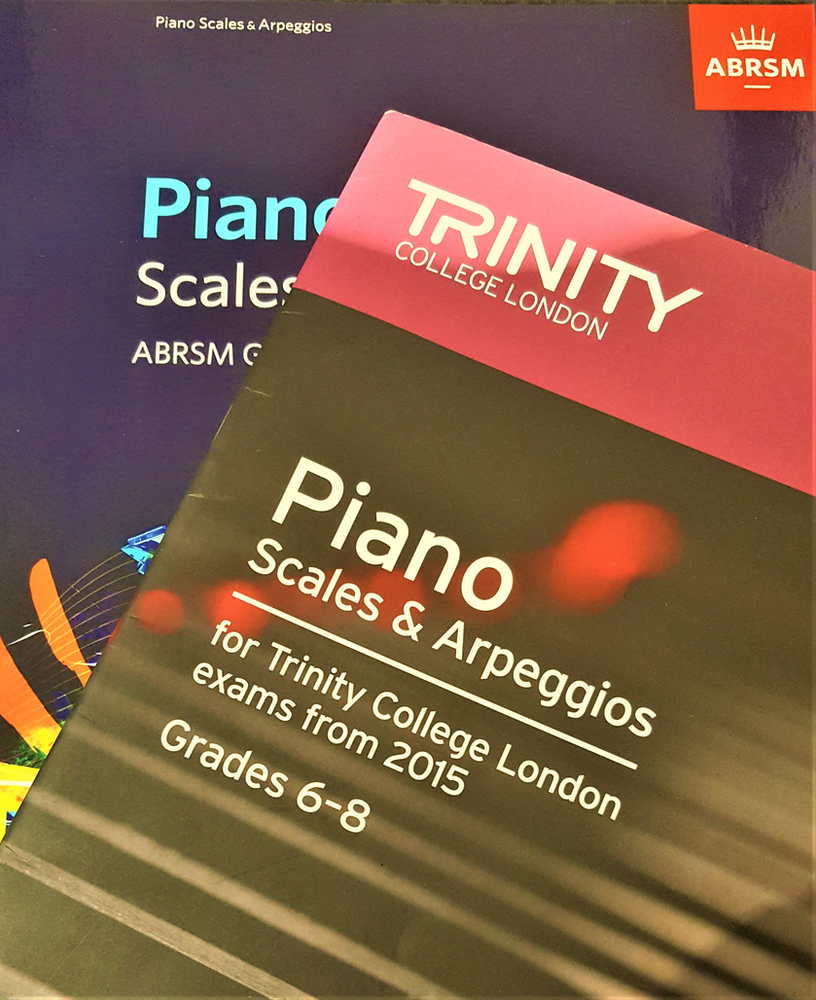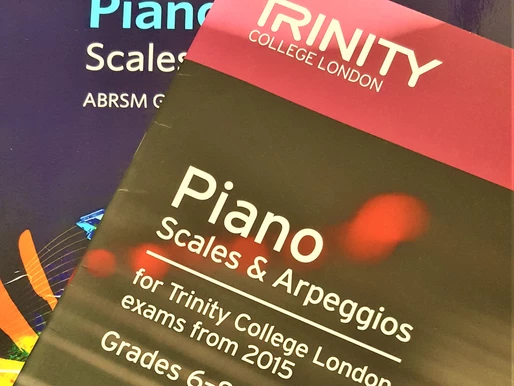Piano Lessons, Uncategorized
Is it better to learn ABRSM or Trinity syllabus?
ABRSM vs Trinity
In this article we will help you choose between ABRSM vs Trinity!

ABRSM Vs TRINITY?
ABRSM or Trinity?
This is a question that we all come across as teachers when wondering about piano exams in the UK and, I think it is not a matter of better or not but they are different according to your goals and targets in your musical education.
If you want to pursue a career in music or you want to build a solid music foundation is better to go with the ABRSM. The ABRSM piano exam diploma syllabus seems to be more complete since the early stages. The sight-reading is compulsory from Grade 1 whilst in Trinity music exam it becomes compulsory from Grade 6. I will try going in order through the different parts of the test.
A little bit about ABRSM and Trinity
What does ABRSM stand for? The initials are for “Associate Board of the Royal Schools of Music”, and it’s one of the five boards accredited by Ofqual (The UK’s Office of Qualifications and Examinations Regulation) to award graded music exams. The other four official boards are the London College of Music, RSL Awards (Rockschool Ltd.), the Music Teachers Board and of course, Trinity College London.
More than 600.000 students take the ABRSM music exams every year in over 93 countries. It also has an editorial that produces music syllabus, sheet music and exam papers.
Trinity offers graduate diplomas in different performing arts and also for the learning and teaching of English, in more than 70 countries. Trinity is part of the Trinity Laban Conservatory of Music and Dance and began offering exams and diplomas in 1877.
SCALES & ARPEGGIOS
¿Trinity or Abrsm? Which one is the best piano grade exam in the UK? In the ABRSM diploma and its syllabus for piano, there are more keys to play in similar motion plus contrary motion and various chromatic scales. From Grade 6-8, thirds and sixth part are introduced alongside contrary motion scales in all keys and chromatic scales in contrary motion too. As for the Arpeggios, more keys are required plus first and second inversions in Grade 7 and 8.
In Trinity piano exams, the numbers of scales and Arpeggios to perform are more limited but they require to perform them in different dynamics and articulation which encourage the musicality development. Also the number of contrary motion and chromatic scales are more limited than ABRSM. In the technical requirement there are three short exercises to be performed which focus on voicing, fingers strength, coordination, balance, wrist flexibility.
As for the technical part of the test, it seems that ABRSM focuses on the technique, knowledge of the key signatures, fingers dexterity whilst Trinity seems to develop some aspects of technique alongside developing musicality.
PIECES
it is quite evident that the ABRSM choice of repertoire is very classical and based on the tradition of classical composers except for the C list where it focuses on more jazzy, bluesy, dissonant, contemporary pieces.
Trinity syllabus offers a wide range of pieces in the style of the Baroque, Classical or Romantic pieces composed by contemporary composers. However, there is also a few range of pieces by classical and romantic composers. It seems that the Trinity offers more appealing pieces for the modern taste. In both syllabuses, the requirement for the test is to perform three pieces in a varied range of mood and style.
SUPPORTING TESTS
Continuing with the Abrsm or Trinity choice, In ABRSM music exams, sight reading and Aural test are compulsory whilst in Trinity music exams, there is a wide range of choice amongs Aural Test, Musical knowledge, own composition and improvisation up to Grade 5. Also, Trinity offers Singing exams.
From Grade 6, sight reading becomes compulsory. Again, it seems that Trinity focuses more on the musical development and creativity rather than the technique and theory knowledge.
These come with Pros and Cons; I must admit that training a Trinity student for a Grade 5 sight reading from scratch is not easy task as I think it is a very good habit to start from the beginning as it is a skill that needs time to be developed and improved. At the same time, I enjoy teaching the Musical knowledge where the candidates are asked questions about dynamics, musical signs, key signature and modulations in the pieces they have performed. I think this is a very good way to improve a sense of analyzing the music one is performing.
As for the Aural Test, the ABRSM exam requires a lot more work for non singers candidate as it is very important to develop the inner ear and be able to think about the sounds in your head and being able to reproduce them. In Trinity, there is not any singing involved and that can be easier for students who are shy in front of an examiner outside their comfort zone.
I hope you will find these information helpful and a guide on your syllabus choice.
Written by Sabrina Curpanen, piano teacher at WKMT
Recent Developments and Updates by Juan Rezzuto
ABRSM Updates
Digital Learning:
ABRSM has increasingly integrated digital resources and online learning platforms to support students’ preparation for exams. This includes apps for aural training, theory, and sight-reading to enhance practice efficiency.
Performance Grades:
ABRSM introduced Performance Grades, a new type of assessment focusing solely on the performance of four pieces, allowing candidates to showcase their interpretative skills and musicality without the traditional supporting tests.
Trinity Updates
Digital Grades and Diplomas:
Trinity has launched Digital Grades and Diplomas, offering candidates the flexibility to record their performances and submit them online. This format has been particularly beneficial during times when in-person exams were not feasible.
Expanded Syllabus Choices:
Trinity continues to diversify its repertoire and syllabus options, offering a broader selection of styles and genres, including electronic music and popular music tracks, catering to the evolving interests of learners.
START YOUR FACE TO FACE OR ONLINE PIANO LESSONS WITH US
Enhanced Comparison
Technical Skills Development:
ABRSM remains focused on a comprehensive development of technical skills through its graded scales, arpeggios, and sight-reading requirements, ensuring a solid foundation in music theory and technique.
Trinity, while also emphasizing technical skills, places a greater emphasis on expressive playing and musicality through its technical exercises, encouraging creativity and personal expression.
Repertoire and Musical Styles:
ABRSM’s repertoire continues to be rooted in classical tradition, with a wide range of pieces from different periods. The inclusion of more contemporary pieces in the later grades provides students with a broad musical perspective.
Trinity offers a more eclectic mix of repertoire, including a significant number of pieces by contemporary composers and more options for students interested in jazz, pop, and other modern music styles, reflecting a more inclusive approach to musical genres.
Supporting Tests and Musical Development:
ABRSM has refined its aural and sight-reading tests to be more inclusive and accessible, incorporating more digital tools for practice. The emphasis on these skills from the early grades ensures a well-rounded musical education.
Trinity offers a unique choice in supporting tests, allowing candidates to tailor their exam experience to their strengths and interests. This flexibility encourages students to engage with music in a way that is most meaningful to them, whether through composition, improvisation, or musical knowledge.
| Factor | ABRSM | Trinity |
|---|---|---|
| Focus | Technical skills, music theory | Musicality, expressive playing |
| Exams | Graded music exams | Graded music exams, diplomas |
| Syllabus | Classical focus, comprehensive | Eclectic mix, contemporary options |
| Scale Requirements | More keys and variations | Scales with dynamic and articulation variance |
| Sight-Reading | Compulsory from Grade 1 | Compulsory from Grade 6 |
| Arpeggios | More keys, inversions from Grades 7-8 | Fewer keys but focus on dynamics |
| Technical Exercises | Technical skills, key signatures focus | Focus on voicing, coordination, balance |
| Repertoire | Classical tradition, contemporary from C list | Broad range, including modern styles |
| Supporting Tests | Aural skills and sight-reading compulsory | Aural tests, musical knowledge, composition |
| Digital Tools | Apps for aural training, theory | Digital Grades and Diplomas |
| New Developments | Performance Grades | Expanded syllabus, including popular tracks |
Conclusion
The choice between ABRSM and Trinity should be guided by the student’s personal goals, learning style, and musical interests. Both boards have adapted to contemporary educational needs, offering a blend of tradition and innovation in their syllabi and examination formats. Whether aiming for a rigorous technical foundation with ABRSM or seeking a more flexible and creative approach with Trinity, students have exceptional opportunities to develop their musical talents and achieve their aspirations in the evolving landscape of music education.
Book your trial piano lessons with us, and start learning ABRSM/Trinity now.
And for your Music Theory skills, join our courses in London and Online now.

